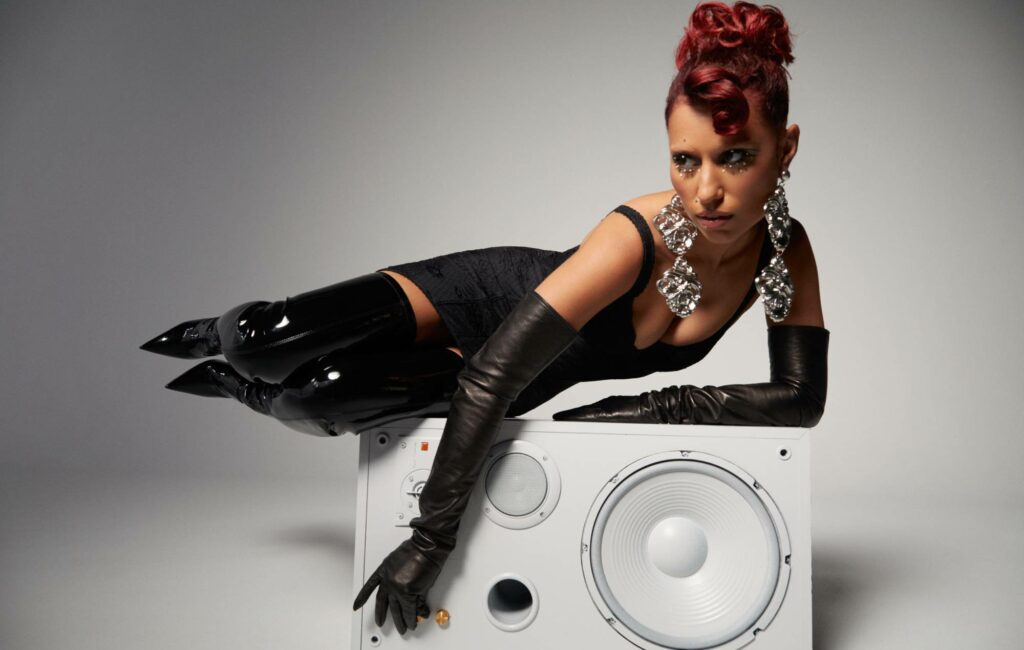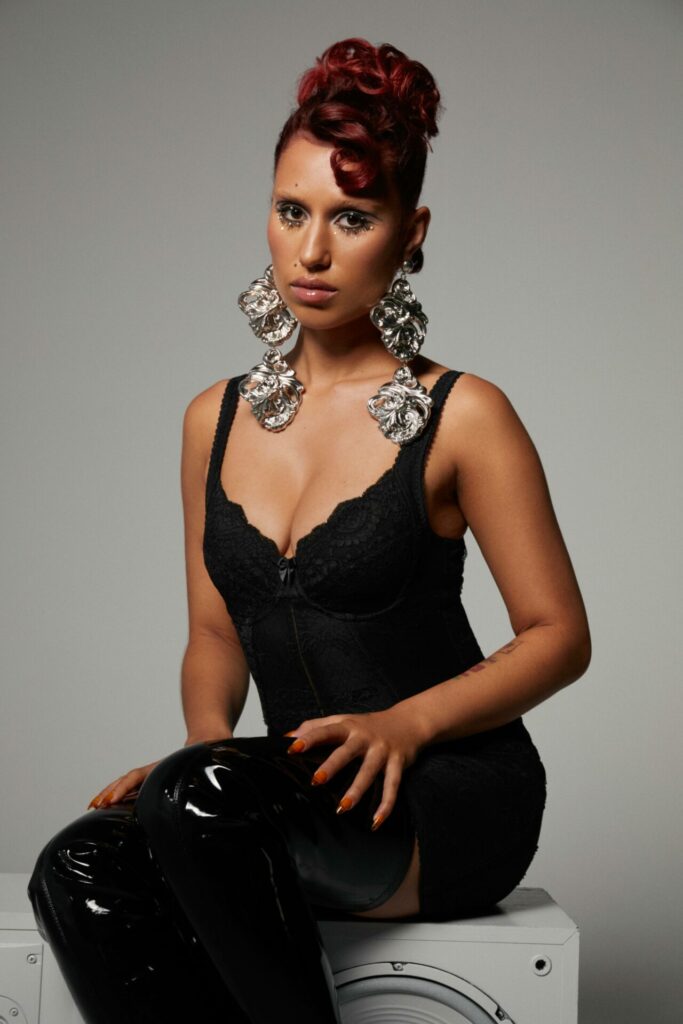Raye: in full control
Having shaken off the shackles of a seven-year contract without a debut record, Raye is savouring a number-one single and the freedom that comes with dropping her long-awaited first album, as she tells Rolling Stone UK

Sometimes it’s good to start at the end. On the last song of Raye’s debut album My 21st Century Blues. — finally due out on 3rd February, after hold-ups that delayed her from releasing a full-length record for the best part of a decade — she speaks directly to the listener over a gently swirling piano riff. “I’ve waited seven years for this moment,” she says. “And My 21st Century Blues. is now ours, forever.”
It’s a poignant conclusion to an extremely hard-won triumph. At only 25, Raye, born Rachel Agatha Keen in Tooting, south London, is already a music industry veteran, and in her time she has seen the underbelly of the machine first-hand. Aged 17, she signed a four-album deal with Polydor, but in early 2022, following years of being creatively stifled, she publicly broke from the label (by the end of their arrangement, Raye had still not been allowed to release an album).
Freedom as an independent artist under the distribution company Human Re Sources followed. Raye and I first speak one morning in late December – she’ll spend the rest of the day at her piano writing for the K-pop girl group Le Sserafim, but for now, she’s cuddled up on the sofa with her pom-chi Yoshi – and by this point, her decision to break ties has been completely vindicated. Her song ‘Escapism’, featuring 070 Shake, which was released in October and became an unexpectedly slow-burning TikTok hit, has just reached number two in the British charts (coming in only behind Mariah’s perennial end-of-year smash ‘All I Want for Christmas Is You’), and number one in Ireland. By the first week of January, the song is her first UK number one single.
‘Escapism’ is a no-holds-barred tale of self-medication with drink, drugs and sex after heartbreak, with an erratic drumbeat, minor chords and punchy, witty lyrics (“I don’t wanna feel how my heart is ripping / In fact, I don’t wanna feel, so I stick to sipping”), all presided over by Raye’s dextrous vocals, which switch from savage to vulnerable in an instant. Having thus far been best known for tracks like ‘You Don’t Know Me’, with Jax Jones, and ‘Bed’, with David Guetta and Joel Corry, as well as her writing work for artists like Little Mix and Charli XCX, her latest release is a far cry from the glossy “formula of dance-pop singles” she had been “ushered into” making by her label. The single’s success is a victorious testament to the music she had wanted to make, and has believed in deeply, all along.
Raye tells me as much when I catch up with her again after the single tops the UK chart, and she explains how it feels to have been right all along. “I was crying all day when I found out,” she says. “It just goes to show that you should back yourself no matter what, and the fact we’ve done it independently is just crazy! Right now, I feel like anything is possible.”

It is, of course, the perfect time for a bit of forward momentum, as she gears up to release her debut album. “To be finally sharing these songs with the world is just a dream come true,” Raye says. “Money can’t buy where we are right now, and that is so exciting. These are stories I’ve wanted to share for so long.”
Indeed, as her first-ever full-length, My 21st Century Blues. is the record Raye has been waiting a lifetime to make, and she holds nothing back, employing genres including the dance pop she is known for, but there is soul, blues, rap and R&B here, too. “There’s no sonic through-line,” she says. “It was just creating whatever feels right for the story I want to tell over it. It just feels free.” What is most remarkable, however, is what she is courageous enough to discuss on this album: “There’s things on there that some of my closest friends don’t even know about me,” Raye says now. “Even though it’s difficult and tricky at times, I do believe art is about being ruthlessly honest.”
Many of the songs on My 21st Century Blues. tell jaw-droppingly candid tales, on topics including her mistreatment at the hands of the music industry, her thoughts on the UK’s broken political system, her struggles with addiction and eating disorders, as well as her experiences of sexual assault.
The latter is discussed on ‘Ice Cream Man’, which Raye began writing at the age of 19 (around “60 per cent” of the tracks on the album are “songs I’ve had for years but was never encouraged to share. It’s music that has also stood the test of time for me,” she explains). The track lies at the midpoint of the record, and opens with an almost funereal organ sound, as Raye resignedly starts to discuss her experiences at the hands of a producer who invited her to make music with him. In the song’s words: “When I got there should have heard what he was saying / Trying to touch me, trying to fuck me, I’m not playing.”
How does it feel, I ask her, to have committed something so painful to music? At first, her response is understandably tentative: “As a woman in and out of this industry, I’ve been through a lot of nasty, traumatic things that I bottled up, didn’t talk about, buried. I didn’t feel like there was a place that I could put it. There’s very much a world in which I could have gone on the internet or called up the police, but all of the shit that comes with… plus, I squirm a little bit even talking to you about it,” she admits, “because there’s still a lot of healing that needs to take place there.”
“I’ve got nothing to lose anymore — before, I did, but now I don’t. It’s been the most liberating thing”
Raye
Then, however, her voice grows more confident: “For me the power really is, this is my way of getting to scream through the flipping microphone: ‘You know who you are and you know what you done.’ Sadly, more than one man and more than one time in my life. But you’re going to listen to this song and you’re going to know. That’s power.”
On the song’s chorus, Raye shifts the narrative away from men who took from her, and back to herself: “I’m a very fucking brave, strong woman,” she sings. And in general, she says the “ethos” of My 21st Century Blues. is about reframing and “normalis[ing]” conversations on hard topics. “I do believe that when you put [something difficult] into the light it has less power over you, I guess,” Raye explains. “Maybe that’s my motivation in wanting to be so explicit.”
As such, she also talks candidly about other issues she addresses on the record. “Body dysmorphia is something I’ve struggled with for years,” she says, discussing the track on the album named after the condition. She remembers occasions when she would be “wearing, like, three flipping Spanx and a corset underneath my outfit so that I feel like I can go outside! I’m trying to squeeze the notes out onstage and I can barely sing them! But no one would bloody know!” And elsewhere, ‘Mary Jane’ details past issues with substance abuse (these days, she says, she’s “doing really great”), specifically with marijuana, codeine and alcohol.
Raye describes the track as “a love song to my addiction. There was a time when I was so lonely, and I was letting down everyone I loved, and I couldn’t explain why. Again, something that no one would know. We keep it in silence. You do hear substance abuse being glamorised by rappers, but it’s historically always been gross for a woman to open up about these things, or she gets penalised for it. Look what they done to Amy, you know? Meanwhile, we’re being eaten alive by these things we’re too scared to talk about, especially as women.”
As an artist, these are topics Raye has long been desperate to discuss — and that she hasn’t been is a travesty; she is as brilliant an emissary as any number of her socially conscious male peers, like Stormzy and Dave. She says that she “didn’t know how to communicate that narrative when I’m releasing songs like the songs I was releasing, that just gloss over heartbreak with happy pop.”
Since leaving her label and taking full control of her debut, however, Raye feels that she has “said what I needed to say. It’s just kind of like, an air of no fear,” she says. “I’ve got nothing to lose anymore — before, I did, but now I don’t. It’s been the most liberating thing.” It genuinely sounds like a weight has been lifted clean off her.
Although she describes her independent status as “a feeling money can’t buy,” in some ways, it took Raye “a lot of time to adjust,” she admits. “It’s taken a while to shake off those things that limit the creative process,” she says of the generic constraints that were placed on her during her time at Polydor. Then she laughs: “Being the boss of my career feels like a new thing, which is wild!”
To get to this point, however, she did need some level of closure. “I went through my healing,” Raye remembers. In February 2022, she says, “I went to Sam Fender’s afterparty at the BRIT Awards, just after I’d become independent, and he’s on their label, I went up to all of them, was like, ‘Hey!’ I confronted everyone! One of them ran away from me,” she laughs, “but everyone else was very gracious. We had a nice chat, and I was able to find some sort of peace.”
This has left Raye free to reap the spoils of all she has had coming to her for so long. 2023 will see her finally release My 21st Century Blues., go on tour, and make more music, as she finally steps into herself as the artist she has always been. “I’m just going to enjoy this moment,” she tells me. “I’m going to enjoy that I was right to back myself.” Then, she exhales, taking it all in. “We’re here now.”
